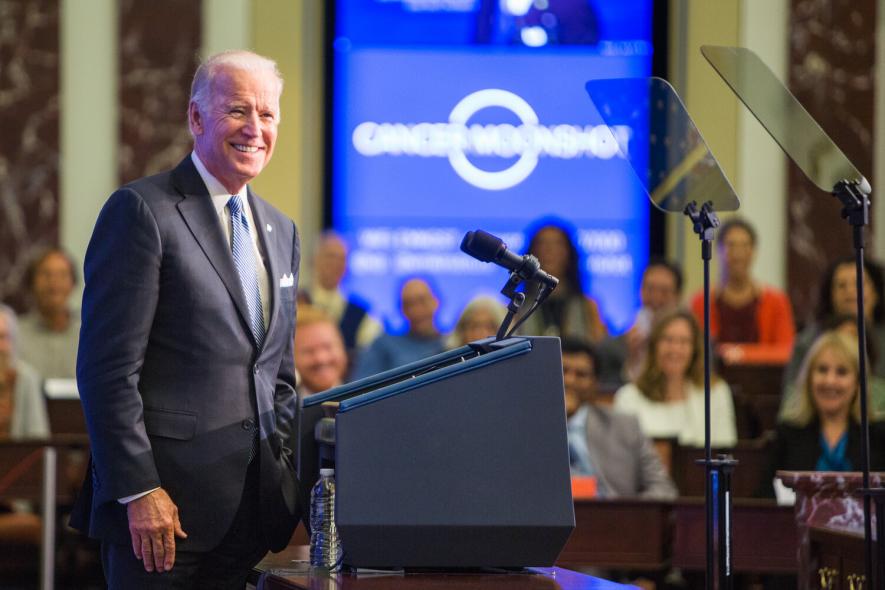Biden Is Facing a Showdown on Iran Sanctions

President Trump has called the Obama-initiated nuclear agreement for Iran a “horrible one-sided deal” and withdrew from it in 2018. Except he really didn’t.
This past summer, Secretary of State Mike Pompeo began a series of appeals to the UN Security Council, saying that the United States was still a member of the deal, based on the council’s 2015 favorable vote by former U.S. ambassador to the UN Samantha Power. Therefore, Washington had the right to initiate the “snapback”—a procedure that allows participants of the deal to reverse any easing or lifting of sanctions instituted by the pact.
This led to several UN Security Council meetings, where most members rejected Pompeo’s arguments. But Pompeo called for the snapback in late September, despite “objections from most other countries.”
“We will not make fools of ourselves,” one senior European diplomat said.
Phantom Snapback
Of course, the phantom snapback had a purpose—to justify heaping more sanctions on Iran and hoping the rest of the world would honor them. Since most countries rejected this position, the United States threatened secondary sanctions against any country dealing with Iran. With the dollar as the world’s standard currency, Washington could take monetary action against nations violating its unilateral sanctions. Therefore, European firms had difficulty in trading with Iran.
At issue is Security Council Resolution 2231, adopted in 2015, which endorsed a nuclear deal known as the Joint Comprehensive Plan of Action (JCPOA) to prevent Iran from developing an atomic bomb. The pact took two years of intensive negotiations under the Obama administration to complete. Russia, China, France, Britain, Germany, the European Union, and the United States were parties to this agreement.
Iran abided by the deal and curtailed its expanding nuclear program before Trump came to power. In return, it received certain compensations, including the unfreezing of its funds in the United States.
But everything changed after Trump took office, withdrew from the JCPOA, and placed sanctions on Iran.
The stated purpose of the Trump administration has been to force Iran into negotiations beyond the nuclear program, such as stopping the development of ballistic missiles and support for regional proxy forces. The strategy has been unsuccessful in achieving any of these goals.
“When Mr. Trump took office, Iran had roughly 102 kilograms, or 225 pounds, of enriched uranium,” according to the New York Times. A restricted report by the UN International Atomic Energy Agency (IAEA) said that Iran now has more than 2,440 kilograms of low-enriched uranium, which is more than eight times the limit set by the 2015 nuclear deal. Iran says that it will return to the nuclear deal limit on uranium if Biden lifts the U.S. sanctions on Iran.
Now What?
President-elect Joseph R. Biden has made known his intention to rejoin the nuclear deal.
“I will offer Tehran a credible path back to diplomacy,” he said in a September op-ed for CNN. “If Iran returns to strict compliance with the nuclear deal, the United States would rejoin the agreement as a starting point for follow-on negotiations.”
But it is not that easy. Before Biden takes office, the Trump administration is heaping a plethora of sanctions on Iran—and even considering military action.
The latest—and to many shocking—step is to designate “Yemen’s Iran-backed Houthi insurgents a terrorist organization,” as Foreign Policy and other news organizations report. Democrats in Congress and many aid groups fear this would undermine fragile peace talks in the country after six years of war and famine against a wobbly government backed by Saudi Arabia.
No doubt Iran will want a lifting of as many U.S. sanctions as it can get before it gives up its nuclear materials. “Where Iran is concerned, there are hard-liners and hard hard-liners… in both camps,” according to an op-ed in the Los Angeles Times by Ambassador Wendy Sherman, who led the U.S. team in the nuclear talks as undersecretary of state for political affairs. Analysts say the U.S. should ease some sanctions before Iran’s June elections, as Tehran’s stance could harden after that.
Until sanctions are lifted, Iran faces a particularly challenging COVID-19 crisis with restrictions on its ability to get financial and medical resources. In March, Iran requested a $5 billion emergency loan from the International Monetary Fund to combat COVID-19, but the U.S. blocked it. Even if a Biden presidency means the easing of financial sanctions to provide relief, there are also sanctions imposed for human rights violations, ballistic missile development and support for terrorist groups, which might be more difficult to reverse.
Some sanctions appear imposed for spite. One such sanction is the restrictions placed on U.S.-educated Iranian foreign minister Mohammad Javad Zarif, a favorite on American talk shows.
The Europeans believe that issues not related to the nuclear deal should be addressed separately. The Atlantic Council recommends that Britain, France and Germany during this transition phase should “outline what is necessary for Iran to freeze nuclear activities that exceed the JCPOA’s limits. This is likely to be heavily tied to a sanctions relief package from the Biden administration.”
Before Biden takes office, though, President Trump and Secretary Pompeo appear eager for one last word on Iran. There seems to be no limit on how many draconian measures they can adopt during the transition phase.
This article was produced by Globetrotter. Evelyn Leopold is a writing fellow and correspondent for Globetrotter. She is an independent journalist based at the United Nations as resident correspondent. She was bureau chief for Reuters at the UN for 17 years, and is chair of the Dag Hammarskjöld Fund for Journalists. She was awarded a gold medal in 2000 for UN reporting by the UN Correspondents Association and is a member of the Council on Foreign Relations.
Get the latest reports & analysis with people's perspective on Protests, movements & deep analytical videos, discussions of the current affairs in your Telegram app. Subscribe to NewsClick's Telegram channel & get Real-Time updates on stories, as they get published on our website.























